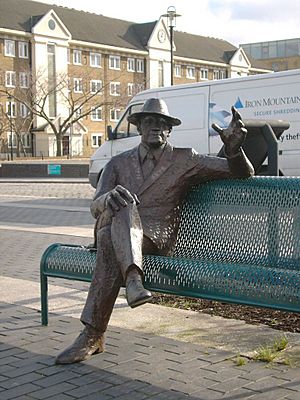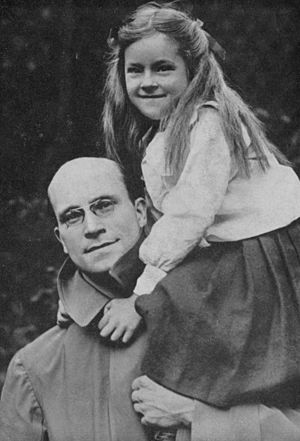Alfred Salter facts for kids

Alfred Salter (born June 16, 1873 – died August 24, 1945) was a British doctor and a Labour Party politician. He is remembered for his dedication to helping the poor and for his pioneering work in healthcare, especially in the Bermondsey area of London.
Contents
Early Life and Medical Work
Alfred Salter was born in Greenwich in 1873. He studied medicine at Guy's Hospital in London, becoming a qualified doctor in 1896. He earned special awards for his studies in public health and pathology.
In 1898, Alfred moved to Bermondsey, an area in south-east London near the River Thames. At that time, Bermondsey was very poor, with many people living in difficult conditions. Many men worked in the docks, but their jobs were often temporary, making it hard to earn enough money.
Alfred joined the Methodist Settlement, a community project that helped local people. There, he started health insurance plans and taught adults about health. In 1900, he married Ada Brown, who shared his passion for social change. In 1902, their daughter, Ada Joyce Salter, was born. Sadly, Joyce died in 1910 during a scarlet fever outbreak in the slums. She was their only child.
After marrying, Alfred opened his own medical practice in Bermondsey. He and Ada worked together to improve life for the working-class families there. Alfred often treated people for free if they couldn't afford to pay. This led to him creating a new kind of health service in the area, which was very advanced for its time.
Entering Politics to Help Others
Alfred Salter realised that he could make bigger changes in Bermondsey by getting involved in politics. He wanted to improve the living conditions more quickly.
In 1903, he was elected to the Bermondsey Borough Council. He also joined the local board that helped look after the poor. In 1906, he became a member of the London County Council, representing Bermondsey. He was part of the Progressive Party at first, but later joined the Independent Labour Party.
Alfred tried to become a Member of Parliament (MP) for Bermondsey in 1909, but he didn't win. He also ran for the London County Council again in 1910 and 1913, but was not successful.
All elections were paused during the First World War. After the war, in 1918, Alfred Salter ran for Parliament again in the new Bermondsey West area. People knew him as a highly educated person who had devoted his life to helping the poor. He was also known for his peaceful views during the war. He didn't win this election either.
In 1919, local elections started again. Both Alfred and his wife Ada ran for the London County Council, but neither was elected. However, in November of that year, Ada was elected to the Bermondsey Borough Council. She later became the first female mayor of the borough in 1922.
Serving as a Member of Parliament
In the 1922 general election, Alfred Salter ran for MP in Bermondsey West again. This time, he won! He received 7,550 votes, with a good majority. His wife, Ada, as the mayor, was the person who officially announced his victory.
He lost his seat in the next election in 1923, but won it back in October 1924. He continued to be re-elected in 1929, 1931, and 1935. He decided not to run in the 1945 election because he was very unwell. He passed away soon after, at the age of 72.
Alfred Salter's Beliefs
Alfred Salter was a man of strong beliefs. He was a committed Christian and became a Quaker in 1900. He was also a Pacifist, meaning he believed in peaceful solutions and opposed war. He was an active member of the Peace Pledge Union.
He helped start the Socialist Medical Association. He believed that everyone should have access to good healthcare. He and his friend, George Lansbury, believed that peace could be achieved by addressing the causes of conflict.
During World War II, Bermondsey was heavily bombed. Alfred Salter was one of the few politicians who spoke out against the bombing of German cities, even though his own area was being attacked. He believed it was morally wrong to bomb civilian areas.
Alfred was also a strong supporter of the Temperance Movement, which encouraged people to avoid alcohol. He believed that alcohol caused many problems for working-class families. He also believed strongly in free speech. He even resigned from his local Labour Party group when they tried to stop a march by another political group, because he felt everyone should have the right to express their views.
Alfred Salter's biggest impact was in health. Even before the official National Health Service was created in Britain, he helped create a local health service in Bermondsey. This included campaigns to prevent illness using films and advertising, and opening one of Britain's first multi-purpose health centres in 1936. Because he offered free treatment to the poorest, he is often credited with creating an "NHS before the NHS" in his local area.
Memorials to Alfred Salter
Alfred Salter's legacy is remembered in several ways:
- In 1990, a plaque was put up in Greenwich to mark his birthplace.
- The Alfred Salter Primary School opened in 1995 in Rotherhithe.
- The Alfred Salter Bridge is a footbridge near Greenland Dock, part of the Russia Dock Woodland.
- In 2002, a plaque honouring both Alfred and Ada Salter was unveiled at Bermondsey tube station.
- A statue of Alfred and his daughter, Joyce, called "Dr Salter's Daydream," was unveiled by the river in 1991. The original statue of Alfred was stolen in 2011, but new statues, including one of Ada, were unveiled in 2014.
- The Quaker Socialist Society holds a "Salter Memorial Lecture" each year.
See Also
- Ada Salter
Images for kids
 | Aurelia Browder |
 | Nannie Helen Burroughs |
 | Michelle Alexander |




